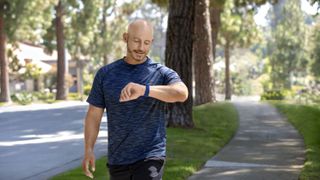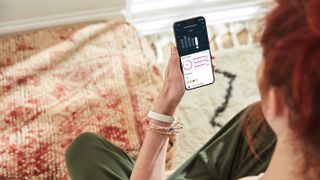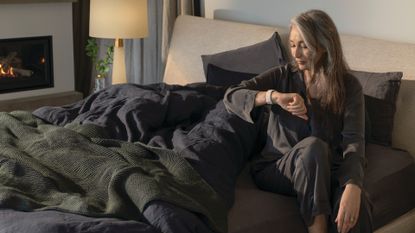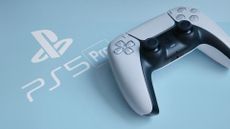Fitbits are awesome wearables. They are sleek and have a user-friendly interface – no wonder they are in such high demand. One other reason why Fitbits are so sought after is that they not only track sleep but can score it and recommend ways to improve your slumber, putting them amongst the best sleep trackers around. But have you ever thought about how Fitbits track sleep? It's more and less complicated than you think.
To get an expert opinion on the matter, we asked Dr Conor Heneghan, Senior Staff Research Scientist at Fitbit (and therefore Google), to fill in the gaps in our knowledge about all things Fitbit and sleep. Which is the best Fitbit for sleep tracking? Can Fitbit fitness trackers detect sleep apnoea, and is it OK to sleep with Fitbit?
"We continue to collect clinical data to test and develop features for sleep apnoea screening, but this feature is not fully developed yet", says Dr Heneghan, "But yes, Fitbit devices have been designed to be worn during sleep." Good to know, as we've been wearing Fitbits for sleeping for years at this point.
Ready to learn more about how does Fitbit track sleep? Read on to find out.
How does Fitbit know you are sleeping?
"Fitbit's sleep tracking features use advanced signal processing and machine learning algorithms to track total time slept, as well as identify trends in restlessness and the amount of time people are awake during a sleep period", Dr Heneghan explains.
These algorithms also review night motion patterns of being asleep and the level of Fitbit users' restlessness. The Sleep Stages feature (link to Fitbit's blog on the subject) uses accelerometer data, heart rate variability (the changes in time between beats) and algorithms to more accurately estimate how long you spend in light, deep and REM sleep stages (as well as time awake) each night.
"The Fitbit R&D team conducted extensive internal testing by observing and analysing several hundred nights of heart rate and movement data from volunteer sleepers", Dr Heneghan adds, "While simultaneously characterising their sleep with gold-standard lab equipment when first implementing these features, and we continue to analyse and iterate on them today."

Moving around regularly can help you achieve higher Sleep Scores
What is a good sleep score on Fitbit?
The Fitbit Sleep Score can help people understand their sleep patterns over time and what is impacting the quality of their sleep so that they can make changes to improve it.
Dr Heneghan says Fitbit users' overall nightly sleep score is based on heart rate, the time spent awake or restless, and sleep stages – how long you spend in light, deep and REM sleep. The score is a sum of individual scores in sleep duration, sleep quality, and restoration, for a total score of up to 100.
Duration focuses on how much you slept, and the more you sleep, the better you score. Sleep quality looks at how much time you spend in deep and REM sleep; the more time you spend in these stages, the higher your score. Finally, restoration tracks how relaxed you were during sleep; a high sleeping heart rate lowers your score.
Most people get a score between 72 and 83.
Sleep score ranges are:
- Excellent: 90-100
- Good: 80-89
- Fair: 60-79
- Poor: Less than 60
How to improve your Fitbit Sleep Score?
That's one thing you know what your Sleep Score is; but how do you improve it? Dr Heneghan has six tips for you to ensure your slumber is as good as it can possibly be:
1. Create your schedule
Getting to bed at a consistent hour every single night may be difficult in today’s world, but it’s another essential part of a healthy sleep routine. Your body and brain thrive on routine and part of what sets that routine is a consistent sleep schedule. You can set a schedule in the Fitbit app to help you meet your sleep goal and maintain consistent sleep patterns and can set either a bedtime, a wake-up time target, or both.
2. Adjust your environment
If possible, you should always aim to sleep in total darkness but if that’s not possible and you’re comfortable doing so, try wearing an eye mask. You should also aim to sleep in total silence. If necessary, you can use earbuds to drown out the sound. If you’re worried about missing your alarm, then worry not because Fitbit’s "silent alarm" feature alerts you at your chosen wake-up time with a vibration that’s gentle enough to wake you up without startling you as the traditional alarm sound might.

3. Ensure to exercise
One of the best things you can do for your sleep happens long before your head hits the pillow and that’s ensuring you are active throughout the day. Activity promotes healthy levels of many hormones and other chemicals in the body, which in turn is believed to promote healthy sleep.
Fitbit can help you manage your daily exercise routine so that you can increase or decrease your output depending on how you feel it’s affecting your sleep. Using your Fitbit, you should target 150 Active Zone Minutes each week, or 22 minutes daily, as recommended by the World Health Organisation.
Active Zone Minutes counts your time spent in any heart-pumping activity and helps you stay motivated with on-wrist notifications as well as recognising how hard you are working with personalised heart rate zones based on your age and fitness level.
4. Practice mindfulness and unwind
Meditation sets off a slew of changes in the body that is way more effective than counting sheep at promoting dozing off. Studies have proven that people who practise mindfulness meditation experience sleep quality improvement on par with those seen from using other proven sleep treatments such as cognitive behavioural therapy or relaxation training.
The Mindfulness tool in the Fitbit app includes mindfulness sessions and can help you track and understand the effects of your mindfulness practice. You can choose a weekly mindfulness goal, set reminders to complete a mindfulness session, reflect on your stress level, and more. There are 300+ mindfulness sessions available on Fitbit Premium to help you manage stress, practice mindfulness or unwind before bed.

5. Say No to Screens Before Bed
If you want to make it easier to fall asleep at night, disengage from all screens and electronics at least an hour before bedtime. Instead, try reading a book until you’re feeling drowsy enough to turn off the light.
Another great thing about Fitbit’s silent alarm is that it means you don’t have to worry about having your phone within reaching distance when your alarm goes off in the morning. So, you set your Fitbit screen to appear off whilst you sleep and not be tempted by screens.
6. Caffeine and alcohol
Be aware of some of the subtle effects of caffeine and alcohol on your sleep quality; for example, a glass of wine may make you feel like you fall asleep quicker, but on average alcohol will lead to a lighter sleep later in the night, so look out for changes in your sleep score when you have some drinks - for example, alcohol can slightly raise your heart rate which may lead to a less rested state than normal.
Which Fitbit is best for sleep tracking?
"All of our current Fitbit products with heart rate sensors track a user's sleep, including the Fitbit Sense, the Fitbit Versa 3 (and Versa family in general ), Fitbit Luxe, Fitbit Charge 5 and Fitbit Inspire 2", says Dr Heneghan.
Better still, all Fitbit users receive the same sleep tracking features (metrics) in the Fitbit app and on-device to help better understand and improve their sleep. Fitbit users with a Premium membership will get deeper insights into their sleep. these deeper insights are:
1. Sleep Score breakdown
A deeper analysis of your free daily Sleep Score, with a breakdown of your score and graphs to show how it was calculated based on your time asleep, deep and REM sleep stages and restoration, along with guidance on how to improve your score and overall sleep quality.

2. Time asleep score
See how your time asleep vs. awake impacted your score. While it’s normal to spend some of your sleeping hours awake, too much can lower your score. Your score is also based on if you reach your sleep goal each night.
3. Deep and REM sleep stages score
Understand how time (and percentages) spent in each stage of sleep adds to or detracts from your score. These regenerative sleep stages give you an understanding of your sleep quality.
4. Restoration score
See how your sleeping heart rate compares to your average resting heart rate -- an indicator of a restful night’s sleep, and how much time you spend tossing and turning. Your score will be higher if your heart rate is lower during sleep compared to your resting heart rate. See your sleeping heart rate and how it differs from your resting heart rate as an indicator restful night’s sleep, and how caffeine, alcohol, stress, illness, or other actions can impact your night and as a result the following day.
5. Cross-correlated insights
Insights based on your Fitbit data that reveal connections between your sleep and your activity for an increased understanding of how your actions can impact your sleep quality, i.e.:
- Exercising 3-4 hours before bedtime can help improve your overall sleep quality (vs. in the morning or right before bed).
- The more consistent you are about going to bed at the same time every night, the lower your resting heart rate is likely to be (an average of 3bpm lower)

Does Fitbit track your sleep for free?
All Fitbit users receive free features (metrics) in the Fitbit app and on-device to help better understand and improve their sleep.
"With Fitbit Premium, users can access a deeper Sleep Score breakdown", Dr Heneghan says, "Guided sleep programs to focus on key areas, from setting a consistent schedule to getting more restful sleep; cross-correlated insights based on the user's sleep and activity data, and sleep audio relaxation and mindfulness tools."
And here is the kicker: the purchase of a new Fitbit smartwatch or tracker includes six-month Premium membership! Check out the best Fitbit deals below.



